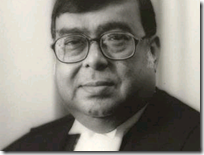Altamas Kabir
The collegium system of judges’ appointments has come under judicial scrutiny again, through a petition for review of the Supreme Court’s nine-judge bench verdict in 1993 in Advocates on Record Association V Union of India.
The petition filed by a Rajasthan-based trust prays for an 11-judge bench to reverse the 1993 decision upholding the primacy of the collegium system.
Chief justice of India Altamas Kabir and justices SS Nijjar and Jasti Chelameswar are hearing the matter, after a bench of justices Deepak Verma and BS Chauhan referred it to the chief justice’s bench last year. Senior advocate AK Ganguli with advocate Bharat Sangal are the amicus curiae. Attorney General Vahanvati and the government have been issued notices.
Ganguli told the court that the procedure adopted in the collegium system "is contrary to constitutional foundations of democracy, separation of powers and checks and balances”. He added that the system “resulted in an anomaly in as much the executive no longer has to share any responsibility in filling up of vacancies in the courts; the entire responsibility being that of the collegium”.
Vahanvati argued that even though the 1993 decision should be reconsidered, the petition filed by a trust was not maintainable under Article 32 of the constitution. [Express]
The collegium system was most recently under the Supreme Court’s consideration in 1998 under a presidential reference. [via @jimanish]
Newly appointed CJI Altamas Kabir has restored the practice of “oral mentioning” of matters in the Supreme Court, and applications for early hearing of matters, which his predecessor Kapadia had abolished when he had assumed office in May 2010 [The Hindu]
After Forbes profiled CJI Kapadia’s career at its dusk, it is now time for The Telegraph to docket India’s future boss Altamas Kabir’s run-up of seven years and 21 days to the helm, and his days before and after.
Sending a husband to jail for taunting his wife on her dark complexion, ruling for power to trans-gender people, giving a landmark judgement bringing female relatives of the husband definitively under the Domestic Violence Act, Kabir fought for the undermined against the might of the state in his time at the Supreme Court.
As the 57-year-old chief justice of Jharkhand high court, where he was transferred to within weeks of being appointed chief at the Calcutta high court, he set up juvenile courts and passed several orders on the welfare of remand-home inmates.
Often the last judge to leave the Supreme Court, Justice Kabir is popular with junior lawyers
Junior lawyers always felt confident arguing their cases in his court as they knew that he would give them a patient hearing
We need people like him who understand what it means to be marginalised, stigmatised and ostracised simply for the fact that we are who we are
No less delighted at Justice Kabir’s elevation are the 43 inmates of Women’s Probation Home in Namkum, Ranchi. They call him and his wife Minna Kabir “Papa” and “Mummy” [Telegraph India]
 It’s four in the evening and shadows lengthen along the main corridor of the Supreme Court of India. It is Friday, a miscellaneous day, and all courts have completed their work in time to enjoy what passes for a busy lawyer’s weekend - Friday evening.
It’s four in the evening and shadows lengthen along the main corridor of the Supreme Court of India. It is Friday, a miscellaneous day, and all courts have completed their work in time to enjoy what passes for a busy lawyer’s weekend - Friday evening.
All except one court.